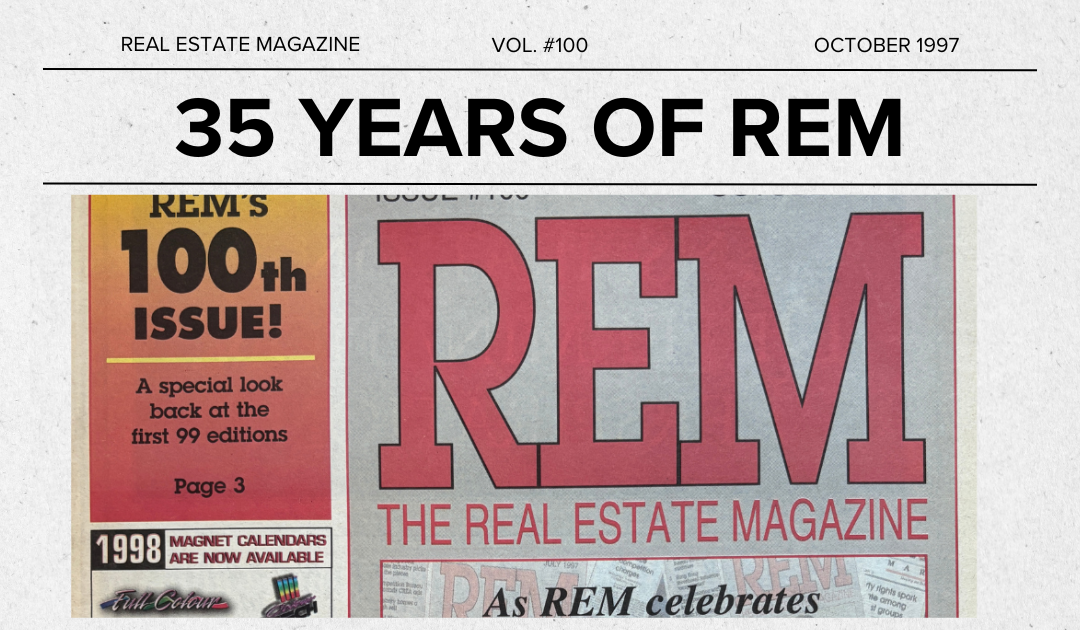To mark 35 years of Real Estate Magazine, we’re sharing articles from past issues. This article appeared in REM’s 100th Issue in October 1997 and was written by Kathy Bevan and Susan Doran.
To be a Realtor 20 years ago, you needed a pen, a calculator, a sturdy briefcase, a set of wheels to transport you and your clients to listings, and lots of quarters for pay phones along the way.
Today’s Realtor still needs that trustworthy pen, that calculator, that set of wheels. But now Realtors also need modems, cellular phones, fax machines, and likely carry two briefcases—one for paperwork, the other for a laptop computer.
As Realtors have evolved, so have their demands upon organized real estate. How those demands are being addressed has led to an industry-wide re-examination of organized real estate.
Two years ago, CREA was singled out for blistering attacks by several boards, which sent it scrambling to justify its annual fees. But the underlying problem was much broader and more evident at the grassroots level of organized real estate. Boards themselves were coming under the increasingly critical scrutiny of their own members, and their structures and fees were under assault as well.
Real estate companies began questioning overlapping jurisdictions, duplication of services, multiple board dues, and what they saw as the undue haste with which costly new technology was being introduced at the board level. Everywhere, it seemed, dues-paying members were asking, “Just what am I getting for my money anyway?”
“The dissatisfaction people began voicing shouldn’t really have caught organized real estate by surprise, because it had been occurring in all facets of life,” says Al Demings, executive officer at the Halifax-Dartmouth Real Estate Board (HDREB). “People everywhere were questioning the value they were getting for their money. Consumers moved over to discount stores looking for better value, but they’ve come back to local stores for better service.”
What service does organized real estate provide to keep its members coming back?
The most obvious answer is the MLS system.
“Canada has the most successful MLS system in the world,” says Jim McKeown, associate broker at Coldwell Banker Rhodes and Company in Ottawa. “What surprises me is how quickly we’ve forgotten what MLS has done for all of us. If there’s anything wrong with organized real estate right now, it’s that it hasn’t sold its members on the value of MLS and the other services it provides.”
Some Realtors may not be aware, or interested, in the inherent value of the MLS system, but the boards that provide MLS data to their members know its worth all too well. Many boards have been reluctant to share their data with neighbouring jurisdictions, for fear they’ll lose control of their most valuable asset.
“There is a problem with territoriality—so many boards see MLS as such an important part of what they’re all about, that they can’t envision a world where they aren’t fully in control of their own MLS service,” says Demings. While Demings admits his board would be greatly downsized if it didn’t have MLS responsibilities, he believes HDREB is much more than just an MLS provider. “We’re here to ensure the highest professional standards are maintained, that there is cooperation and good networking opportunities, and that consumers get the best quality service,” he says.
The Halifax-Dartmouth board, while recognized as being one of the most successfully progressive boards in the country, has had its share of criticism, largely due to its emphasis on being a “cutting edge” organization.
When the board brought in a new Compass online system two years ago, it belatedly discovered the modems most of its members were using weren’t very compatible. Board staff spent two months running around the city, re-setting office modems. When HDREB was one of the first boards to switch to electronic lockboxes, it ran into unexpected difficulties again. The initial keypads had a fault, and by the time the error was identified, HDREB members were in an ugly mood. The board redeemed itself somewhat by giving all the lockbox owners an unconditional guarantee: if it malfunctions, it would be replaced at no cost to the Realtor.
The Toronto Real Estate Board (TREB) didn’t have the same perseverance, and unlike HDREB, did not make its new electronic lockbox system mandatory. After a testy initiation period where few Realtors signed on for the new system, TREB chose to mothball the lockbox collection.
The lesson for both boards: being on the cutting edge can sometimes be injurious to your health. TREB has since decided it can’t afford to experiment with new technology—it’s trying to go with “tried and true” from now on.
Concerns about cost-cutting have brought some small boards into data-sharing agreements with large boards; fears of membership erosion and resulting increased fees have kept other small boards away.
MLS data sharing
Boards in outlying areas are also concerned about “big city poachers” coming out to sell their listings and undercut their members’ ability to earn a living.
“Our people don’t want ‘weekend Realtors’ heading up from Toronto to try to sell properties where they don’t understand issues like septic tank systems and shore access,” says Chris Hundley, president of the Muskoka Real Estate Board, north of Toronto. “We’d rather keep our MLS system a closed one than open ourselves up to that kind of problem.”
Al Demings of HDREB has heard similar arguments, but he doesn’t think they pose a long-term threat. “You might find a Halifax Realtor making that two- to three-hour drive to try to sell a property in an area he doesn’t know, but you won’t find him doing it twice. It’s not worth the time, or the risk of dealing in unfamiliar properties.”
In provinces with small numbers of Realtors, organized real estate is also being pressured to move toward regional MLS systems.
“We only have about 1,400 Realtors in Nova Scotia, so it would be very practical for us to have just one MLS system,” says Sandy Rutledge, broker/owner of independent Domus Realty. “In outlying areas where there isn’t a good local MLS system, people just don’t join. That’s something a regional MLS system would help solve.”
In Manitoba, with only four real estate boards, discussions have been underway for several years about forming a single MLS system to serve the entire province. All four boards entered into an interboard listing agreement in 1987, but have yet to take the final steps toward a regional system.
“A single MLS system is definitely doable here—the question would be: would the smaller boards survive?” asks Winnipeg Real Estate Board’s executive director, Gary Simonsen.
“A regional MLS system has been part of our strategic planning discussions since 1993,” says Brian Collie, executive officer of the Manitoba Real Estate Association. “But we have to come up with a plan everyone can live with.”
In B.C., northern boards such as the Cariboo Real Estate Association (CAREA) keep in touch with their southern counterparts through data-sharing agreements that, in effect, give Realtors in that province the equivalent of a regionalized MLS system.
“Between the VanDat system and our other software hookup, Wave, Realtors in almost all of B.C.’s 13 boards can do search listings right across this province,” says CAREA executive officer Dorothy Friesen.
The London and St. Thomas Real Estate Board (LSTREB), formed by a merger back in the 1950s, has signed agreements with 10 surrounding boards to share MLS data.
“The trend is toward MLS ‘pods’ being formed, where central organizations such as ours become the data supplier to outlying areas,” says Betty Doré, executive officer at LSTREB. “And the Internet, once it gets fast enough, will provide the way to link us all together, right across Canada and North America.”
Fear of the Net
Not all boards are looking forward to using the Internet’s future potential. The fear still lurks that the Internet will somehow swallow up the MLS system whole if it is allowed increased access. Recent announcements that Microsoft intends to offer consumers a new Internet real estate service and that AOL has joined forces with RealSelect to set up their own Internet home listing service have just added to those worries.
“There are definitely concerns about how much longer organized real estate can keep a stranglehold on MLS information,” says Sandy Rutledge, broker/owner of Nova Scotia independent firm Domus Realty. “But saying the industry won’t share its MLS is a bit like Bell Telephone saying it won’t share its phone lines with resellers. It can’t remain in a monopoly position forever.”
Yet what some see as a threat, others see as an opportunity.
“The Internet will work for us, not against us, as Realtors,” says Jerry England, president of TREB. “Consumers may soon be doing a lot of their initial purchasing research on the Internet, but they’ll still want a Realtor to help them buy and sell their homes. This is a people business, and the Internet will never replace the human, one-on-one interaction that lies at the heart of this business.”
CREA president Tom Bosley has been seeking to extend that human, one-on-one interaction down to the grassroots level of organized real estate—to the Realtors themselves. He has appealed to provincial associations and local boards to be allowed to interact directly with Realtors, in an attempt to create a better understanding of just what CREA, MLS, and the title “Realtor” should mean to everyone in the real estate industry.
Not all associations or boards have welcomed Bosley’s and CREA’s efforts. Here, too, territoriality comes into play. But the CREA message does have its supporters.
“What does it cost most of us to belong to CREA, a provincial association and our local board—about $1,200 a year?” asks Jim McKeown. “That’s a pretty small fee for what we get. I mean, how can you put a price tag on the confidence consumers have in our MLS system? And ultimately what the public sees is the MLS—not the board, not the association—they see that MLS sign, and they call us up.”
Even boards that don’t agree with CREA’s direct approach see the value in organized real estate working together, as long as everyone is working toward the same goal.
“Circling our wagons around our members’ best interests can be a positive action, if we all point our guns outward, toward forces outside our industry which threaten us,” says Brian Smith, executive officer at TREB. “It’s when people start shooting inward that we have real trouble.”
Susan Doran is a Toronto-based freelance writer who has been contributing to REM since its very first issue.
















Good writing!
Good memories!
Good idea to reprise it